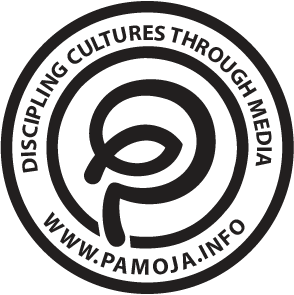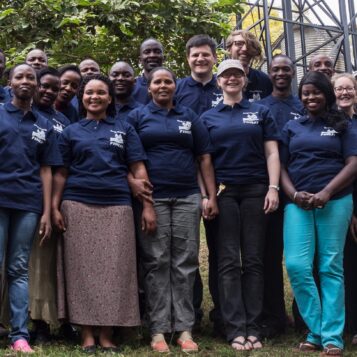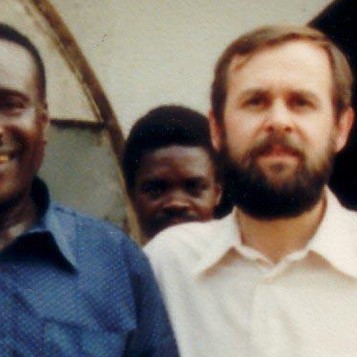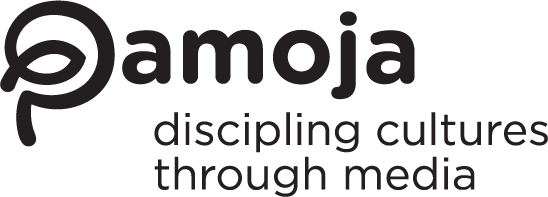Pamoja is Discipling Cultures through Media
We aim to equip Christians with a Biblical worldview, empowering them to be competent and confident facilitators of community transformation.

Our Ministry Products
For more than 20 years, Pamoja Ministries has been deploying media in East Africa, and the growth over the last few years has been staggering (to the point where we have felt overwhelmed at times), but it has all led us directly to this point, and we are confident that we know what God is […]

Our Team
We’re a constantly changing group of people. Just posting a list of who we are is a guarantee that we’ll be out of date. There are people who are here, but have not yet arrived. Others are here, but not here right now. There are those who are working with us, having never been here, and […]

Our History
History is a funny thing – it doesn’t really have a beginning – but the history of Pamoja Ministries can be linked with Sig & Joy Feser’s arrival in Africa. That happened in 1986, when Sig Feser went on a fact-finding trip to Kinshasa, DR Congo (then called Zaire), following the call of God. Africa […]
Discipling Cultures through Media
The Mission of Pamoja is urgent and timely. We exist to make disciples of Jesus Christ. That is the call of the Church. That is the mission of the Church. That is the way of life that we are called to. Discipleship talks of whole-life formation. Many writers have, over the last years, brought to light the need for us to engage in every sector of society as Godly men and women, and that is what discipling aims to do - to take the disciple through a process of formation that leads them to become more and more like Christ. That should have ramifications in every sphere of life - from business integrity to family structure to charitable involvement to servant leadership in government, to Church involvement in local community problems. Discipleship is not limited to any particular group of people - whether pastors, or adults, or men, or the educated ones. In fact, Jesus said that unless we become like little children, we cannot enter the Kingdom of Heaven. Our call to discipleship is to make disciples of all people.
Discipling: the process of formation that leads us to become more and more like Christ.
In achieving our aim of making disciples, we each have a different part to play. Many are called to be intensively involved with a few, for instance a Christian ministry to orphans or to widows or Bible school programs. We are called to be involved at an extensive cultural level. We at Pamoja Ministries are called to pursue discipleship by targeting self-identifying groups of people (cultures and sub-cultures) through media. At every time and in every place, the gospel has to be presented to people in ways that they can understand and engage with it. The gospel must be presented as the eternal solution, and its application shown to the deepest and most current of needs and struggles. Cultures are self-defined groups of people who share values, world views, and goals, as well as troubles and needs. By targeting cultures, we are addressing things as per the Great Commission - making disciples of all nations (ethnos = cultures). Does this prevent us from engaging with the few? No. Our community of missionaries, employees, and volunteers - those who are gathered together - are also engaged fully in the process of formation, together and individually, and we are constantly seeking ways to deepen and broaden our understanding of Christ Jesus and his way of life.
Cultures: self-defined groups of people who share values, world views, and goals, as well as troubles and needs
In discipling cultures, our calling is specifically to use the tools of the day to engage with eternal truths. Today, cell phones, tvs, tablets, and radios are the carriers of the content of our cultures. We, as change agents, aiming to shape culture, aim to involve ourselves in the relevant media - speaking in ways that people want to listen. But this is not to be confused with a watered-down gospel. Rather, we believe that we can and must present eternal truths; we must present the gospel as the liberator of the oppressed, as sight to the blind, as the resurrection of the dead.
Media: the carriers of the content of our cultures
Pamoja is Discipling Cultures through Media. Will you join us?
Everyone knows that it’s better to teach a man to fish than to hand him a meal. What’s even better is to equip that man to train other people to fish. Equipping churches in East Africa with the knowledge and tools they need to transform their communities is the goal of Pamoja’s ministry. Properly deployed, our media will result in more Christians, living with greater freedom, greater self-sacrifice, and greater expectations; making life better for everyone around them by providing servant leadership in all sectors of society.
Economic growth and massive demographic changes in East Africa are presenting churches with new challenges. Helping the church to meet these challenges has provided Pamoja Ministries with abundant opportunities for ministry. Growing prosperity has focused many people’s attention on the question of how best to manage their money. Our Biblically-based financial literacy program is now being used across Tanzania to help answer these questions and spread the message of the gospel. Although approximately 75% of East Africans are under the age of 25, the church has very, very few resources dedicated to reaching young adults and children. Our television shows, movies and cartoons are helping to fill this vital gap through evangelism (movie showings), and training (kids camps and vacation Bible schools).
We have always been a very project-oriented organization, but as we grow, so too does our capacity. Now we are beginning the process of rolling out some ongoing programs in addition to the projects. Read on for information about the various programs and projects we're working towards!
PROJECTS
By tackling specific projects, big or small, that achieve the goals we have set out (this is how we have primarly operated in the past). These may be musical, video, animation, tv, print, or other media projects, and they very often involve partnerships with other organizations whom God has called to particular emphases that align with our mission and vision.
The En-kata Choir (Maasai Choir)
- Since 2008, Pamoja has been the record label for an amazing choir from Simanjiro, Tanzania. The En-kata Choir represent with their songs so much of what Pamoja is about. They are using song to sing change into their community. Their choir meets every night under the stars in several different locations, and they sing songs that they have written and adapted - songs that fit the cultural modes they are used to. Their songs tackle the main issues facing their communities for which their grassroots NGO was registered: HIV/AIDS, Education, Clean Water, Rights of Women & Children, and Evangelism.
Pamoja's partnership with The En-kata Choir has enabled them to reach much further than ever before. Thousands of albums and thousands of copies of a book, En-kata, A Time For Singing, have been sold, enabling them to build The En-kata English Medium Primary School in Orbili, Tanzania. At the En-kata Primary School, children are taught by Maasai teachers, at home in a Maasai community. Pamoja does not run the school and we are not represented on the board of the grassroots NGO. Rather, we operate as a record label should - with counsel in areas where we are qualified, and by representing the choir and its music, advocating for them, and even touring with them 4 times across Canada and the United States.
Global Pathways (Missions Training)
- In 2014, we met Go To Nations, a mission sending agency out of Jacksonville, Florida, and specifically Dr Jerry Williamson and Jim Oxendine. Dr WIlliamson was responsible for the creation of the Global Pathways materials, intended to be presented in seminar format to Church leaders across denominational boundaries. Developed in Russia, the curriculum is a call to the majority world Church to engage in the call to missions. Jim Oxendine, an experienced missionary, familiar with the curriculum, has been doing seminars and training in Tanzania with the curriculum, but before that could start, they partnered with Pamoja Ministries for the translation, typesetting, publishing, and printing of the Global Pathways manual in Swahili, entitled Njia ya Kufikia Mataifa. Released in 2014, the material has been rolled out to the pastors of hundreds of churches across multiple denominations, and will continue to be rolled out over time. Pamoja does not own the material, we do not do the seminars, but by managing the logistics and the language for Go To Nations, we are enabling them to go farther than they could before, and to reach the very people we are called to speak to, with a message which directly relates to the mobilization of the Church.
Mwandani wa Biblia (Swahili Concordance)
- Written by our Executive Director, Dr. Sig Feser, Mwandani wa Biblia is the most accessible, and most widely distributed concordance in Swahili. Aimed at a pastor with little training, Mwandani wa Biblia has been in use for 20 years, as the best available method for teachers and preachers wishing to speak topically to their congregations. In many cases we have been told of the impact of this book. Through it, we are enabling the leaders of tens of thousands of churches from Kinshasa, DR Congo to Juba, South Sudan and from Nairobi, Kenya to Bujumbura, Burundi - across all of East Africa - to do better discipleship in their churches. The book was written by us, but we partner with many others along the way to make the book available to tens of thousands of pastors and leaders.
Maswali Kuhusu Fedha (Financial Literacy Training)
- Since 2013 we have been working together with VisionFund Tanzania and World Vision Tanzania to develop and deploy an absolutely incredible curriculum to teach people how better to manage their money, with. World Vision and VisionFund together are in community with hundreds of thousands of Tanzanians, and their model is structured around becoming deeply involved in local communities, often for a decade or more. During that time, they aim to transform those communities through a wide variety of services covering as many spheres of life as possible. Pamoja has developed an animated teaching series entitled Maswali Kuhusu Fedha (Questions About Money) which approaches this incredibly important topic from three directions:
- by presenting the training through a window on a local community, with existing cultural practices highlighted to develop financial competency, and with a focus on financial development for the good of the community.
- by building a curriculum that is comprehensive, tackling the topics that are needed by the local community in order to have financial success in the long term.
- by pulling from the Biblical perspective on finances to train people not just to succeed, but to model servant leadership in their finances personally, as well as in their families, work environments, and communities.
LEADERSHIP TRAINING
If we are going to disciple cultures, it's clearly not going to be a solo effort on our part! One key way that we can participate is by providing resources to Church leaders, who are thought leaders among Christians. As we are able to prepare them to focus their teachings on equipping and mobilizing Christians to reach their local communities, their regions, nations, and the world at large, we will see the church become more and more effective in those areas. For 20 years we have been doing this through a partnership with World MAP, through resources such as Acts Magazine (1992 - 2008) and The Shepherd's Staff (ongoing). Our involvement with World MAP and these amazing resources provides a case study that is tremendously useful to us in measuring and planning the possible scope, cost, and outcomes of discipling cultures through media.
Welcome to Pamoja! We wish you were here in East Africa with us, but we realize that all of you can’t always be here with us, so this website is our attempt to be there for you, wherever you may be. Have a look around, and if you have any questions, comments, suggestions, thoughts, requests, or generally any feedback at all, please let us know.
